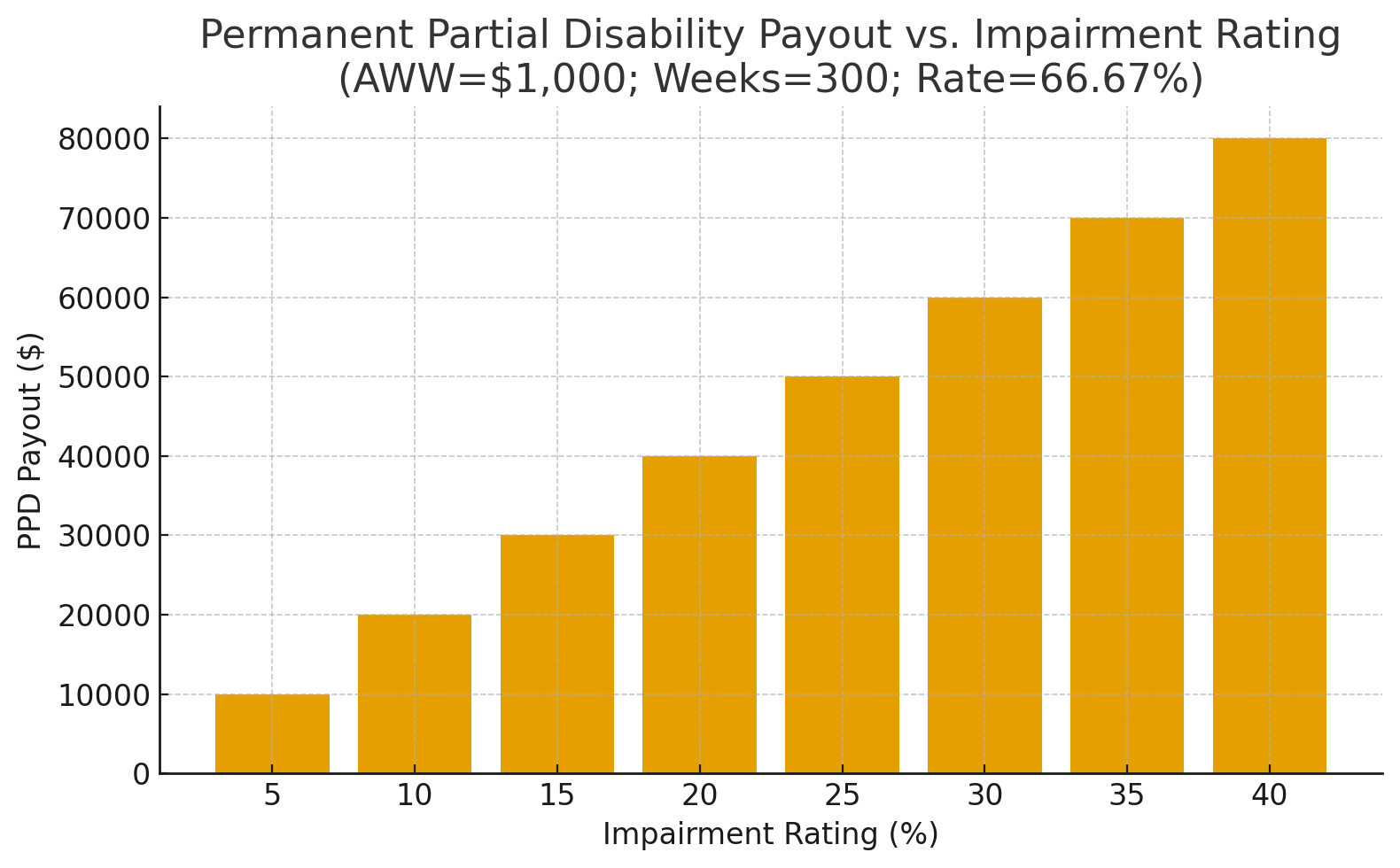How Permanent Disability Workers’ Comp Settlements Are Calculated in North Carolina
Workers’ compensation is a vital system that provides employees with medical benefits and wage replacement if they sustain injuries while performing their duties. In North Carolina, the process of determining the workers comp settlement for permanent disability involves several key factors. This blog post will delve into the details of how these settlements are calculated.
Our Charlotte workers’ compensation lawyers help injured employees across North Carolina. Contact us today for a free case review.
The Concept of Permanent Impairment Rating in North Carolina Workers’ Compensation
In North Carolina workers’ compensation law, the concept of a permanent impairment rating plays a critical role in determining how much compensation an injured worker may receive for a lasting disability. After a serious workplace injury, some employees never fully recover even after surgeries, rehabilitation, or extensive medical treatment. When an injury results in permanent loss of a body part, reduced range of motion, ongoing pain, or long-term weakness that prevents a full return to pre-injury condition, a physician assigns what is known as a permanent impairment rating.
This rating is expressed as a percentage and reflects the degree of physical and functional loss compared to the worker’s condition before the accident. Because North Carolina workers’ compensation settlements are heavily influenced by this percentage, the impairment rating often becomes one of the most important factors in calculating permanent disability benefits.
Doctors typically assign the rating after an employee reaches maximum medical improvement (MMI). MMI does not mean the worker is fully healed; it means the injury has stabilized and is unlikely to improve with further medical care. At this point, even if the employee continues to experience chronic pain, stiffness, or permanent deformity, the law recognizes that the condition has plateaued. Once MMI is reached, the impairment rating provides a baseline for determining the number of weeks of compensation available for the injured body part under the North Carolina Workers’ Compensation Act.
For example, injuries to the back, shoulder, or leg each have different compensation schedules, and the impairment percentage is applied to those statutory weeks to calculate a final settlement.
Because the impairment rating directly impacts how much money an injured employee receives, disputes are common. A worker may believe the assigned rating is too low, undervaluing the severity of the permanent disability. North Carolina law allows injured employees to obtain a second medical opinion from a doctor of their choosing. If the first and second ratings differ, the North Carolina Industrial Commission averages the two ratings to arrive at the final impairment percentage used in the settlement calculation. This safeguard ensures that employers and insurance carriers cannot rely solely on a single low rating to reduce benefits unfairly.
In practice, the permanent impairment rating affects every stage of a workers’ comp claim. It determines the amount of permanent partial disability (PPD) benefits, influences negotiations over a lump-sum settlement, and often becomes the key point of contention in hearings before the Industrial Commission. Because of its importance, having a Charlotte workers’ compensation lawyer review your impairment rating, explain how it applies to your case, and pursue a second opinion when appropriate can make a significant difference in the value of your permanent disability settlement.
When is a permanent impairment rating assigned?
A permanent impairment rating is assigned once an employee reaches maximum medical improvement, which is the point where the injury has healed as much as medically possible. Even if symptoms such as pain, weakness, or limited function remain, the condition is considered stable. At that point, the physician evaluates the residual loss of function and assigns a rating, which becomes the basis for calculating permanent disability benefits under the North Carolina Workers’ Compensation Act.
Can I challenge or appeal my permanent impairment rating in North Carolina?
Yes, injured workers in North Carolina can challenge an impairment rating by requesting a second medical opinion from another doctor of their choice. If the second physician provides a different rating, the North Carolina Industrial Commission averages the two ratings to determine the official percentage. Because this rating directly impacts the settlement amount, obtaining a second opinion can significantly increase the value of a workers’ compensation claim, especially if the first rating undervalues the severity of the permanent disability.
Why does the permanent impairment rating matter in my workers’ comp settlement?
The impairment rating matters because it determines how much compensation you receive for permanent partial disability benefits. In North Carolina, the formula multiplies two-thirds of your average weekly wage by the statutory weeks for the injured body part and then applies the impairment rating percentage. A higher rating leads to a larger settlement, and legal guidance can help ensure the rating is fair, accurately reflects your condition, and supports a stronger financial recovery for your long-term needs.
Factors in the Workers Comp Settlement Amount
The amount of workers’ compensation settlement can vary widely depending on a variety of factors. Here are some of the primary elements that can influence the amount of a workers’ compensation settlement in North Carolina.
Injury Severity
The severity of the injury is one of the most critical factors that can affect a workers’ compensation settlement. Injuries that result in permanent disability or require extensive medical treatment will generally result in higher settlements.
Impairment Rating
The impairment rating assigned by the doctor is a crucial determinant in the settlement amount. This rating is a percentage that signifies the extent of your injury and its impact on your ability to perform your job duties.
Average Weekly Wage
The average weekly wage of the worker is another significant factor. The compensation rate for total disability is sixty-six and two-thirds percent (66 2/3%) of the worker’s average weekly wages.

Work Capability
The worker’s capability to return to work after the injury can also affect the settlement amount. If the worker is unable to return to their previous job due to their injury, the settlement amount may be higher.
Disputes and Controversies
Disputes over whether the injury was work-related, the severity of the injury, or the impairment rating can also influence the settlement amount.
Legal Representation
Having experienced legal representation can also impact the settlement amount. Workers’ compensation attorneys can help ensure that all relevant factors are considered and that the worker receives a fair settlement.
Compensation Rates for Total Disability
In North Carolina, when an employee qualifies for total disability, workers compensation pays sixty-six and two-thirds percent (66 2/3%) of the average weekly wages. However, the actual amount should not be more than the amount established annually to be effective January 1.
Calculating the Settlement for Permanent Disability
The calculation for permanent partial disability benefits involves multiplying the average weekly wage by 66.67%, then multiplying that by the number of weeks of compensation allowed for the body part, and finally multiplying that by the impairment rating.
For example, if an employee with an average weekly wage of $1,000 has a 20% impairment rating for a body part that has a compensation period of 300 weeks, the calculation would be as follows: $1,000×66.67%×300×20%=$40,000.
This means the employee would receive a Permanent Partial Disability Payment of $40,000.
Relevant Laws and Statutes
The North Carolina Workers’ Compensation Act (WC Act), Chapter 97 of the NC General Statutes, governs claims for compensation for injuries arising out of employment. The North Carolina Industrial Commission (NCIC) maintains claim records, adjudicates disputes, and approves certain awards of benefits under the WC Act.
Frequently Asked Questions About Workers’ Comp Settlements for Permanent Disability in North Carolina
What is a permanent disability settlement in North Carolina workers’ comp?
A permanent disability settlement in North Carolina workers’ compensation is the financial award an injured worker receives after reaching maximum medical improvement and receiving a permanent impairment rating. This settlement compensates for the lasting effects of a workplace injury, reflecting loss of function, reduced earning capacity, and the medical evidence provided by physicians. The North Carolina Industrial Commission oversees these cases under the Workers’ Compensation Act, ensuring benefits are awarded based on impairment ratings, average weekly wages, and the number of compensable weeks assigned to specific body parts.
How is the workers’ comp settlement for permanent disability calculated in North Carolina?
Workers’ comp settlements for permanent partial disability in North Carolina are calculated by multiplying two-thirds of the employee’s average weekly wage by the number of weeks designated for the injured body part under state law, then applying the impairment rating percentage. For example, a worker earning $1,000 per week with a 20% impairment rating to a body part valued at 300 weeks would be entitled to $40,000 in benefits. This formula ensures compensation directly reflects both wage history and the medical severity of the injury, though disputes and appeals may alter the final award.
What role does the impairment rating play in a North Carolina workers’ comp case?
An impairment rating is central to a workers’ comp permanent disability settlement because it quantifies the degree of lasting injury as a percentage of functional loss. Physicians assign this rating once an employee reaches maximum medical improvement, and the rating directly determines the number of weeks and total benefits payable. If the worker disagrees with the assigned rating, North Carolina law allows for a second opinion, and the Industrial Commission averages the ratings to ensure fairness. Because of its decisive impact, impairment ratings are often the focus of disputes between employers, insurers, and injured workers.
What is maximum medical improvement (MMI) in North Carolina workers’ compensation?
Maximum medical improvement (MMI) is the stage at which a workplace injury has healed as much as it medically can, even if pain, weakness, or reduced function remain. In North Carolina, reaching MMI is significant because it triggers the process of assigning a permanent impairment rating, which then influences settlement calculations for permanent disability. It does not necessarily mean a full recovery, but it sets the legal point where the focus shifts from temporary wage loss benefits to permanent partial disability compensation or, in severe cases, total disability benefits.
How does average weekly wage affect a workers’ comp settlement in North Carolina?
Average weekly wage directly impacts the size of a workers’ compensation settlement because North Carolina law pays disability benefits at two-thirds of this figure, subject to annual maximums. Higher weekly wages lead to higher weekly compensation rates, which, when multiplied by the impairment rating and statutory weeks for a given body part, determine the total settlement amount. Accurate wage calculation, including overtime, bonuses, or secondary jobs, is essential to prevent underpayment, and disputes about average weekly wage are common in Industrial Commission hearings.
What if I disagree with my workers’ comp impairment rating in North Carolina?
If you disagree with your impairment rating in a North Carolina workers’ compensation case, you have the legal right to seek a second opinion from a physician of your choice. The North Carolina Industrial Commission will average the two ratings to determine the official percentage used in calculating benefits. This safeguard protects injured workers from unfairly low ratings that insurers may rely on to minimize payouts, and in many cases, obtaining a second opinion increases the value of the permanent disability settlement.
Does hiring a Charlotte workers’ comp lawyer affect my settlement?
Hiring a Charlotte workers’ compensation lawyer often increases the final settlement value because attorneys ensure that all factors—impairment rating, average weekly wage, medical documentation, and long-term work capacity—are fully considered. Lawyers also challenge low ratings, negotiate with insurance carriers, and present evidence to the Industrial Commission if disputes arise. Because insurance companies aim to minimize costs, legal representation levels the playing field, reduces the risk of accepting inadequate offers, and ensures compliance with the North Carolina Workers’ Compensation Act.
What law governs workers’ comp settlements in North Carolina?
Workers’ compensation settlements in North Carolina are governed by the Workers’ Compensation Act, Chapter 97 of the North Carolina General Statutes. The North Carolina Industrial Commission administers claims, adjudicates disputes, and ensures that permanent disability settlements are consistent with statutory formulas and medical evidence. This law establishes compensation rates, statutory weeks per body part, the right to second opinions, and the benefits available for total disability, permanent partial disability, and wrongful death claims arising from workplace injuries.
Call Our Charlotte Workers Comp Lawyers Today
Understanding the workers’ compensation settlement process in North Carolina can be complex. If you’ve been injured at work, a skilled Charlotte workers’ compensation lawyer can be an invaluable ally.
We specialize in representing injured workers and ensuring they receive fair compensation for their injuries and losses. Contact our law firm today at 704-706-2689 for a free case review.





